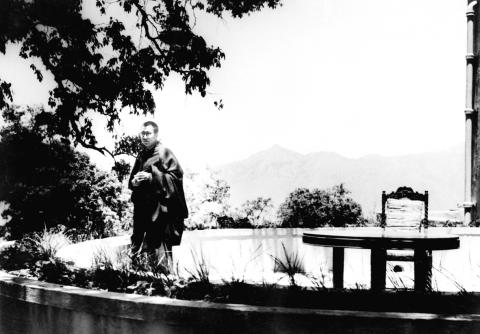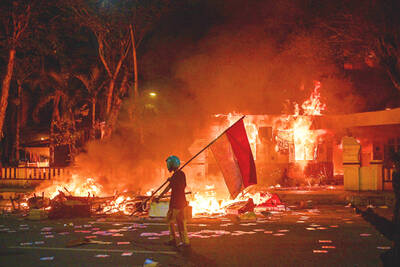In March 1959, Tibet’s ruler and spiritual leader, the Dalai Lama, fled his homeland amid a deadly Chinese crackdown, escaping to India in a gruelling two-week trek.
There he would form a government-in-exile and demand autonomy for Tibet, going on to earn international renown and respect, while remaining a bete noir for China.
Following is an account of his dramatic escape.

Photo: AFP
THE REVOLT
Buddhist Tibet, a vast Himalayan area of plateaus and mountains, declared independence from China in the early 20th century.
However, China took back control in 1951, having sent in thousands of troops.
Lhamo Dhondup, chosen at the age of two in 1937 as the 14th incarnation of Tibetan Buddhism’s supreme religious leader under the name Tenzin Gyatso, was enthroned as head of state after the Chinese invasion.
His co-existence with the Beijing authorities was tense and when the Chinese authorities summoned him to an event without his bodyguards on March 10, Tibetans feared a trap that could endanger their leader.
Thousands assembled at his summer palace to prevent him from leaving; thousands more demonstrated in Lhasa to demand the Chinese depart, the Dalai Lama would later say.
Beijing poured more troops into Tibet: As tensions mounted, they opened fire on March 17, targeting and eventually razing the Dalai Lama’s palace.
The revolt was suppressed by March 21, ending in a bloodbath.
The government-in-exile later claimed the Chinese army killed tens of thousands.
DISAPPEARANCE
The outside world was largely unaware of the turmoil engulfing isolated and remote Tibet. Only India had diplomatic representation there and rare reports of the unrest trickled out via its media.
On March 22, Agence France-Presse reported from India that there was concern over the fate of the Dalai Lama, then aged 23, who seemed to have disappeared.
“According to some rumors, the young man could be in his Lhasa palace or under Chinese military guard,” the report said, citing India’s the Statesman newspaper.
It later emerged that he had been able to slip past Chinese troops massed around his palace on March 17.
GREAT ESCAPE
He left the palace dressed as a soldier and met up with a group of Tibetan resistance fighters 60km out of Lhasa, AFP reported, again citing the Statesman.
His entourage included his mother, sister, younger brother and several top officials. They traveled for two days and two nights without stopping, on foot and on horseback, a Tibetan official later said.
A month’s supplies were carried by mules. To cross the major 457m-wide Brahmaputra River, they used a single boat made of yak skin, the official said.
The group then continued on foot, walking only at night through the harsh Himalayan terrain.
They had a head start on Chinese troops who had not realized the Dalai Lama had disappeared until two days later, only then sending out a ground and air dragnet, and combing monasteries where he could be hiding.
It was “one of the most fantastic escapes in history,” an AFP story said.
ARRIVAL IN INDIA
On March 31, the Dalai Lama walked across the border into the Indian state of Assam.
“The Dalai Lama entered India on March 31 in the evening,” then-Indian prime minister Jawaharlal Nehru announced on April 3, AFP sending out the information in a top priority flash.
In mid-April an official statement provided details of his escape.
“It is thanks to the affectionate support and the loyalty of his people that the Dalai Lama was able to make his way, by an extremely difficult route,” it said.
It denied a Chinese claim that he had been forced into exile.
“The Dalai Lama wishes to categorically state that he left Lhasa and Tibet and came to India of his own free will and not by force,” it said.
GOVERNMENT-IN-EXILE
India granted the Tibetan leader asylum on April 3 and permission to establish a government-in-exile in the northern hill station of Dharamsala, already a sanctuary for thousands of Tibetan exiles fleeing Chinese repression.
From there he launched a campaign to reclaim Tibet, gradually easing this into an appeal for greater autonomy. Talks between the two sides failed, China adamantly rejecting any suggestion of Tibetan autonomy and blacklisting the Dalai Lama a dangerous “separatist.”
Beijing continues to be accused of political and religious repression in the region, but insists Tibetans enjoy extensive freedoms and that it has brought economic growth.

Australia has announced an agreement with the tiny Pacific nation Nauru enabling it to send hundreds of immigrants to the barren island. The deal affects more than 220 immigrants in Australia, including some convicted of serious crimes. Australian Minister of Home Affairs Tony Burke signed the memorandum of understanding on a visit to Nauru, the government said in a statement on Friday. “It contains undertakings for the proper treatment and long-term residence of people who have no legal right to stay in Australia, to be received in Nauru,” it said. “Australia will provide funding to underpin this arrangement and support Nauru’s long-term economic

ANGER: Unrest worsened after a taxi driver was killed by a police vehicle on Thursday, as protesters set alight government buildings across the nation Protests worsened overnight across major cities of Indonesia, far beyond the capital, Jakarta, as demonstrators defied Indonesian President Prabowo Subianto’s call for calm. The most serious unrest was seen in the eastern city of Makassar, while protests also unfolded in Bandung, Surabaya, Solo and Yogyakarta. By yesterday morning, crowds had dispersed in Jakarta. Troops patrolled the streets with tactical vehicles and helped civilians clear trash, although smoke was still rising in various protest sites. Three people died and five were injured in Makassar when protesters set fire to the regional parliament building during a plenary session on Friday evening, according to

‘NEO-NAZIS’: A minister described the rally as ‘spreading hate’ and ‘dividing our communities,’ adding that it had been organized and promoted by far-right groups Thousands of Australians joined anti-immigration rallies across the country yesterday that the center-left government condemned, saying they sought to spread hate and were linked to neo-Nazis. “March for Australia” rallies against immigration were held in Sydney, and other state capitals and regional centers, according to the group’s Web site. “Mass migration has torn at the bonds that held our communities together,” the Web site said. The group posted on X on Saturday that the rallies aimed to do “what the mainstream politicians never have the courage to do: demand an end to mass immigration.” The group also said it was concerned about culture,

CRACKDOWN: The Indonesian president vowed to clamp down on ‘treason and terrorism,’ while acceding to some protest demands to revoke lawmaker benefits Protests in Indonesia over rising living costs and inequality intensified overnight, prompting Indonesian President Prabowo Subianto to cancel a planned trip to China, while demonstrators reportedly targeted the homes of the finance minister and several lawmakers. Rioters entered Indonesian Minister of Finance Sri Mulyani Indrawati’s residence near Jakarta early yesterday, but were repelled by armed forces personnel, Kompas reported. Items were taken from the homes of lawmaker Ahmad Sahroni and two others, according to Detik.com. The reports of looting could not be independently verified, and the finance ministry has not responded to requests for comment. The protests were sparked by outrage over